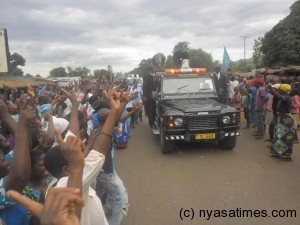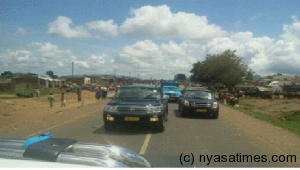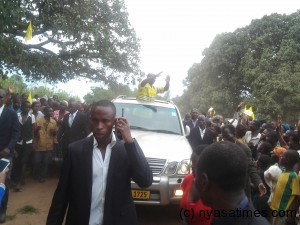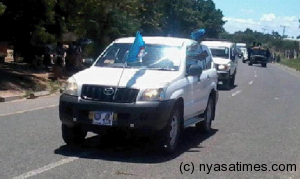For starters
Minister of Information Moses Kunkuyu says the country?s laws do not allow any other individuals but the President and Vice President to travel in a convoy on the roads of Malawi. This follows ruling People?s Party secretary general Henry Chibwana order in presence of the Vice President Khumbo Kachali during a development rally the party addressed at Malombe in Malawi?s lake shore district of Mangochi.
Legal insights
Regarding the alleged ?ban of convoys? and ?archaic laws? on which the alleged ban is purportedly based and which needs to be ?repealed or changed? I would like to share a few insights.
Firstly, the word ?convoy??is not a term of art at law and therefore has not to my knowledge been specifically defined in any of our laws. This simply means that the ordinary meaning of the word ?convoy? applies whenever the law talks of a convoy.
The ordinary meaning of the word ?convoy? is not hard to understand at all: convoy simply refers to a group or series of, among others, vehicles purposefully travelling together usually but not always one behind another in a row. The purposes for travelling together may vary. It may be for the?protection/safety of the vehicles and/or their contents?e.g. very important persons (e.g president or foreign dignitaries) or special goods (nuclear war head or substance). It may be a mere?public show of jubilation or celebration?e.g. wedding. It may be for escorting the remains of a loved one to a place of final rest ??funeral processions; and many more.
The?latter?two purposes and their kindred prototypes are arguably well protected by freedom of expression, among other rights. That right is not absolute ? can be limited as prescribed by the law and hence those types of convoys can be subject of legally permitted limitations. The?former?on the other hand is usually as a result of legal regulation relating to the safety/protection of the people or goods in the vehicles constituting such a convoy.

DPP?s Peter Mutharika convoy

Presidential-like convoy of DPP

UDF presidential candidate Atupele Muluzi on his motorcade

DPP convoy
A good example is what the law calls a ?presidential convoy? which is one of the privileges of the offices of the President and the Vice ? see Part I of the Schedule to the?Presidents (Salaries and Benefits) Act, Cap2.02 of the Laws of Malawi. The Act does not specifically define the term ?presidential convoy? for the simple reason stated above, i.e. convoy has an ordinary meaning, and adding ?presidential? is only meant to distinguish a convoy used by a president from the rest of convoys.
In practice, a presidential convoy usually requires no rocket science to recognize. In addition to convoy vehicles having lights on during the day, police escort vehicle(s) mounted with flash lights of different colours, a forerunner police vehicle sounding a siren to warn other road users, a presidential convoy is also identifiable by the way the cars proceed on the road.
The vehicles usually occupy the entire road, sometimes drive zig-zag affording the vehicle in which the president is full coverage from all sides. They also almost invariably drive on both lanes of a two lane roadway or a dual carriage road in one direction as though it were one road. These among other features are designed to achieve the purpose for which a president travels in a convoy ? protection/safety being the paramount.
To facilitate this, the law regulating usage of public roads permits certain exceptions for presidential convoys. The first is that when a vehicle in which the president is travelling is in motion on any road and is accompanied by an escort (the convoy), the driver of every other vehicle on that road?SHALL, as soon as s/he notices the convoy, pull off the road and stop until the convoy has passed ? see?section 123 (1) of the Road Traffic Act. At?s.123(5) the same Act?specifically stipulates that a dual carriageway (e.g. either side of the Masauko-Chipembere highway) shall be deemed to constitute one road. These two sections are the basis of the practice we observe: you pull off the road when a presidential convoy has to pass as matter of legal obligation, not courtesy; the presidential convoy takes the whole roadway going in one direction.
The manner presidential convoys proceed is an exception because any other road user other than the president is not permitted to proceed as a presidential convoy does. A few provisions can be cited here. In Malawi by?section 96(1) of the Road Traffic Act?you are obliged to drive on the left of the road except where you are overtaking as permitted by the law. Most of our roads are divided into two by an island (the white continuous or broken line) so that traffic going in opposite directions can safely share the road. By?s.97 (1) of the same Act, you are only allowed to drive on the left-hand roadway unless permitted otherwise by a road traffic officer or sign.
More interestingly, you are not allowed to drive on, over, across or within any dividing space (island) except through an opening or as permitted by law (s.97(2) of the Act). Further, by?s.119 of the Act?you are prohibited from willfully or unnecessarily preventing, hindering, or interrupting the free and proper passage of traffic on a public road. Clearly occupying both lanes of a road way is not permitted with a few exception such as when overtaking in accordance with the law.
Furthermore, there are provisions under the Police Act which provide for powers of the police to regulate assemblies and processions on public roads which would come into play when someone considers proceeding on public roads in a manner that may otherwise be contrary to what the Road Traffic Act stipulates as above, among others.
In short therefore, we have laws which regulate traffic on public roads and make a few specific exceptions for presidential convoys. In fact it is often not difficult to?recognize and distinguish a presidential convoy from other types like weddings or funeral processions.
A thing to note is that for a wedding or funeral convoy other motorists stop and allow such convoy to pass out of pure courtesy and not legal obligation as is the case with a presidential convoy. That?s why you can cut into such convoys without legal consequences. That is also why a wedding convoys driving zig-zag or occupying the entire road can be stopped by the police and directed on how to proceed. That is also why a wedding convoy will not insist on zig-zag driving or occupying the entire road if another road user approach without regard to the pomp and ceremony.
It should follow that any person purporting to proceed on public roads in the manner of a presidential convoy will be guilty of contravening the provisions relating to how to proceed on such roads, among others as hinted above. Moreover, to the extent that such person purports to imitate the president by his or her convoy s/he may be obstructing and inconveniencing others on the road.
It is also a threat to safety of others for any other person to proceed on public roads as though they have the privileges of a president because such other roads users have no legal obligation whatsoever to give way to such person?s convoy. Arguably, the following picture illustrates driving that is unsafe and an infraction of the law?if the vehicles are not a presidential convoy.
As for the question whether the alleged ban is a way of hitting at DPP and UDF candidates, I would leave that to everyone?s able mind to speculate. At least I have known the past two administrations to have at one point purported to restrict the use of presidential like convoys.
What I would reasonably draw from the foregoing is that law enforcers may be legally justified to restrict?use of a presidential-like convoy, not on the mere basis that such convoy imitates the presidential convoy, but because such convoy would be contravening the law relating to use of public roads such as where to drive on a public road, not to hinder other traffic, etc to which a presidential convoy is excepted.
Further, and generally, what we must appreciate is that laws can be earnestly used in good faith to achieve the objectives of such law. Laws can also be abused to achieve other extraneous objectives. The motive with which a particular piece of law is invoked or implemented lies with the law enforcers.
We are entitled to draw our own inferences from the obtaining circumstances at each instance informed by all kinds of our own obsessions, inclinations, convictions and idiosyncrasies. In appropriate cases, where one perceives or conjures grounds suggesting that the law is being invoked or enforced?mala fides?(in bad faith), we can approach the courts for the necessary remedies.
Where we think a law is unjust or bad in any other way, we are also entitled to call for change of such law taking into account the rationale behind such law and the change we want to be introduced. Such is the hallmark of a civilized society.
*The author Bright Theu is a private lawyer.
nfl free agents 2012 encyclopedia brittanica nfl free agency jonbenet ramsey jason campbell doobie brothers jennie garth peter facinelli
No comments:
Post a Comment
Note: Only a member of this blog may post a comment.